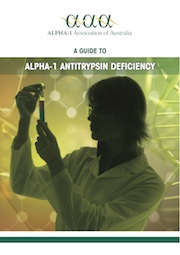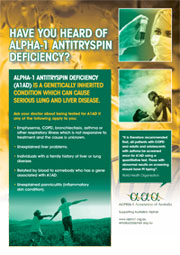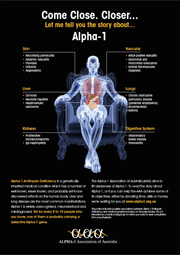Alpha-1 Antitrypsin Deficiency (AATD), sometimes referred to as Alpha-1, is a genetic (inherited) condition that may result in serious, chronic lung and/or liver disease at various ages in life (children and adults). Disease is caused by an abnormal Alpha-1 Antitrypsin (AAT) protein that is mainly produced by the liver.AATD is diagnosed by a blood test. The most alarming news? Current data suggest that less than 10% of those people living with AATD have been properly diagnosed.
AATD is often misdiagnosed as asthma or smoking-related Chronic Obstructive Pulmonary Disease (COPD). How are the lungs affected? The abnormal AAT protein is trapped in the liver, causing a deficiency of the protein that would normally circulate in the blood and protect the lungs from many types of damage. The main result may be emphysema (destruction of supporting structures/air sacs within the lung), even in adult, never smokers. Despite treatments, including protein replacement, adults may require a lung transplant due to severe emphysema.
Liver disorders are caused by the accumulation of the abnormal AAT protein within the liver cells. The effects of such accumulation can range from abnormal liver function tests without symptoms to severe, symptomatic scarring (cirrhosis of the liver) and, rarely, liver cancer. Children and adults may require a liver transplant if the liver is severely affected



